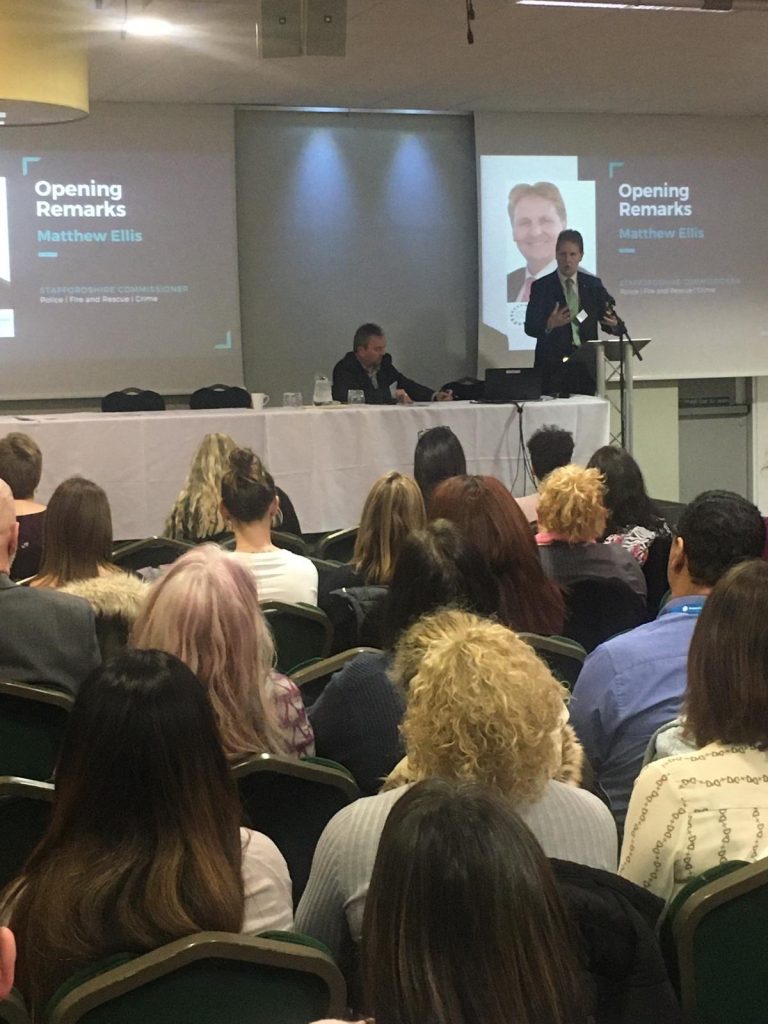Staffordshire’s Commissioner for Police, Fire and Rescue and Crime, Matthew Ellis, today called on key agencies from health, academia and criminal justice to keep up the pressure on ensuring help is there for those in crisis with mental health issues.
Mr Ellis recognised the progress made since 2013 when he first highlighted the issue nationally of mental health and criminal justice and said now is the time to press even harder for continued progress. He implored key partners to keep up the positive momentum.
The Commissioner spoke as he launched the Staffordshire Mental Health Crisis Care Concordat 2020 at a conference at Keele University today (Monday, March 2).
During induction sessions with police officers, soon after being elected, Mr Ellis was astonished at the challenges described. He was shocked specifically at the number of people ending up in police cells because of mental health issues when no actual crime had been committed.
Mr Ellis kicked off work in 2014 to understand the scale of the issues police faced, with people in crisis being held inappropriately in police cells to keep them safe, because they could not access appropriate services.
The ‘Staffordshire Report’ he commissioned, provided detailed analysis of police incidents involving mental health. The case by case illustration of the issue, covered the human aspect and the extraordinary pressures on police officers. It was seized upon by the Home Secretary at the time, Theresa May, who also expressed concern at the situation.
The issue soon became a Government priority and led to improvements in crisis response, as well as the development of the Crisis Care Concordat, which all police forces and PCCs signed alongside other agencies.
Since then much has been achieved across the country and in Staffordshire and Stoke-on-Trent, not least, police cells no longer being used as a ‘place of safety’.
There is now improved urgent access in emergencies to crisis care, but progress is still needed to keep up progress on prevention and importantly access to support before crisis point.
Mr Ellis said:
‘This is an area I’ve felt passionately about since hearing the despair of police officers back in 2013. They were not only spending thousands of hours a year dealing with vulnerable individuals, but were also concerned themselves that cells were not a suitable place for someone, who is simply unwell, not a criminal.
‘It seems a long time ago and I’m encouraged by the strong commitment from all the professionals who are signing up to the revised Crisis Care Concordat today.
‘All agencies in Staffordshire that have played their part in leading the way nationally on this issue over the last few years can be truly proud, but now is the time to do even more. The fact that so many key agencies are here today suggests that we all understand that only too well.
‘With more than 20 organisations from across the county here today I’m confident we’re going to build on what’s already been achieved and continue to help those in crisis.’
The concordat, launched at the Meeting the Needs of People in Crisis event, will explain the new declaration, highlight existing services and developments, celebrate successes, and develop priorities for further action.
Organisations representing health, academia, and criminal justice from across Staffordshire have signed the new Concordat Declaration 2020 to focus on the needs of people in crisis because of a mental health concern and/or emotional distress, and how they can be supported and be kept safe.
Professor Pauline Walsh, Keele University’s Pro Vice-Chancellor for Health and Wellbeing said: ‘We’re proud to pledge our support to this initiative, which could transform mental health care in the region and to host the launch of the new Staffordshire Mental Health Crisis Care Concordat.
‘In the 1960s Keele was the first UK university to introduce a counselling service, and last month we launched a new student mental health project which will feed into the new care concordat as Keele will be working in partnership with the NHS and regional agencies to help develop pioneering, streamlined and sensitive approaches to supporting students effectively.’



